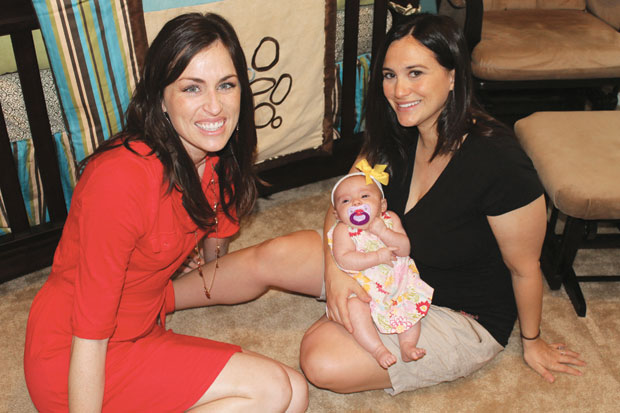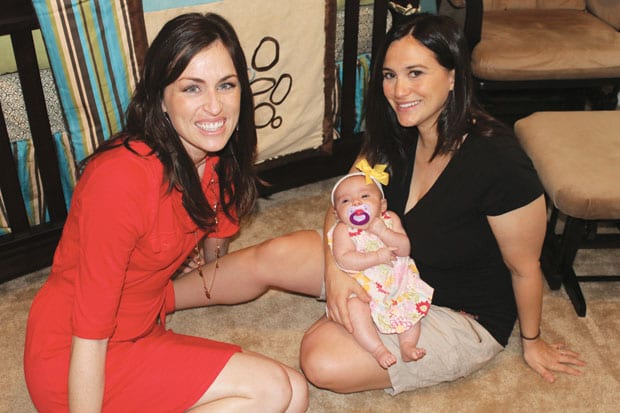Lesbian Frisco couple among those seeking both names on document; Equality Texas pushes state bill after high court refuses to hear La. case

MEET THE PARENTS | Kami Ransom, left, and Kristin Ransom couldn’t both sign Kambryn’s birth certificate after she was born in May because Texas’ Health and Safety Code outlines that only a man, as the father, and a woman, as the mother, may do so. (Anna Waugh/Dallas Voice)
FRISCO — As 2-month-old Kambryn fusses after a feeding in mother Kristin Ransom’s arms, her other mother, Kami, rushes in to comfort her with a pacifier.
The darling child’s face softens as she welcomes the soothing toy, cooing as she rocks back peacefully in Kristin’s lap.
After her feeding, both Kristin and Kami Ransom move about their Frisco home, bypassing baby toys and safety contraptions to play with Kambryn in her nursery.
But their family is not complete yet because the state of Texas doesn’t offer both mothers legal rights to the daughter they share.
Kristin and Kami Ransom married four years ago in Key West.
They started insemination attempts last June and began looking into the legal process when they became pregnant, filing the paperwork for a second-parent adoption in October.
But only Kristin, as the biological mother, was allowed to sign the birth certificate when their daughter Kambryn was born May 15.
“We’re in the hospital celebrating the birth of our daughter, and they bring in the paper to sign and Kami’s not able to sign,” she said. “It was a little bit of a slap in the face.”
The couple began the official adoption process after Kambryn was born with social worker visits and more paperwork. While the process is just finishing up, Kristin said the ultimate goal would be for Kami to sign the birth certificate one day.
“It’s very clear to everyone around us and to our family that we are a family so we wanted to make sure that it was as recognized to the world as it could be,” Kristin said. “We aren’t just going to sit around and wait for Texas to catch up with our family. We wanted to make sure we had our bases covered for our daughter now.”
Having the option to go to court in San Antonio or Austin, they’ll travel to Austin in August to finalize the adoption.
Even after the adoption is complete, Kami still won’t be allowed to sign the birth certificate, despite being Kambryn’s other parent from before her birth.
“We knew all along that I wouldn’t be able to sign the birth certificate, but we wanted to make sure we both have equal rights as parents,” Kami Ransom said.
Parents of the same-sex cannot both sign a birth certificate in Texas because the state’s Health and Safety Code outlines that only a man, as the father, and a woman, as the mother, may sign it.
Ken Upton, a Dallas-based senior staff attorney for Lambda Legal, defended a gay couple in 2007 after Louisiana refused to issue a new birth certificate for their son they adopted in New York because Louisiana doesn’t recognize adoption by unmarried parents.
Upton won the case but later lost on appeal. The Supreme Court declined to hear the case last year, leaving the decision up to states on whether to issue new birth certificates.
Equality Texas has pushed to change the requirements in the state Legislature to allow same-sex parents who are a couple — as well as others who may be family members — to have their names on birth certificates, Executive Director Dennis Coleman said.
A bill has been proposed the last three sessions but never made it to debate. Coleman said he hopes the bill will move forward next year so families can have greater legal protections.
“We will advocate again and hopefully we can get this done,” he said.
A second-parent adoption legally provides the same benefits as signing a birth certificate. However, Coleman said a second-parent adoption requires more paperwork to prove that the other parent can legally enroll a child in school or take them on a trip, when many times just the certificate would be needed.
“You have children who are missing part of their parental unit when you can only have one parent on the birth certificate,” he said. “If we’re advocating for children to have both parents, then why would we put up anything to block that?”
Coleman said the extra legal work for gay couples is more than opposite-sex couples who are allowed to sign the birth certificate even without marrying. And the cost of the adoption for the Ransoms at about $5,000 in legal fees is also a byproduct of the biased law.
“If everyone was allowed to marry, you would not have to go through all of these hoops to make sure that your family is legally protected,” he said.
The Ransom family agrees, but finds worth in the legal chaos they’ve nearly completed because of the protections they’ll have for their family.
“Bringing a child into the world is an incredible miracle and it should be celebrated, but the cost and all of the loops you have to jump through are just a tiny little piece of the big picture,” Kristin Ransom said. “It’s totally worth every second.”
This article appeared in the Dallas Voice print edition July 27, 2012.


